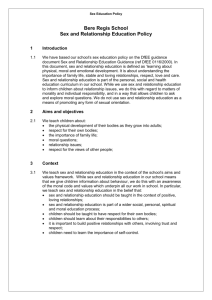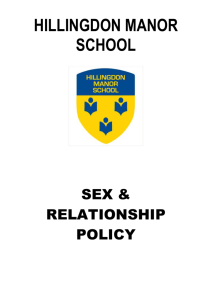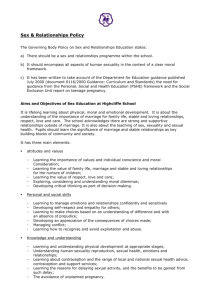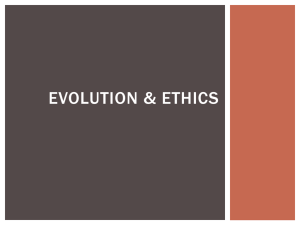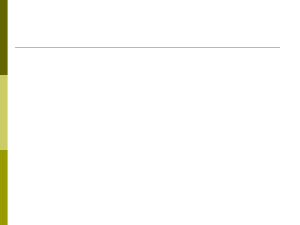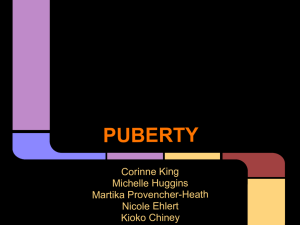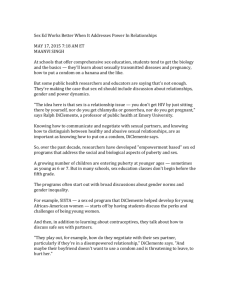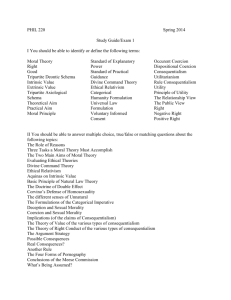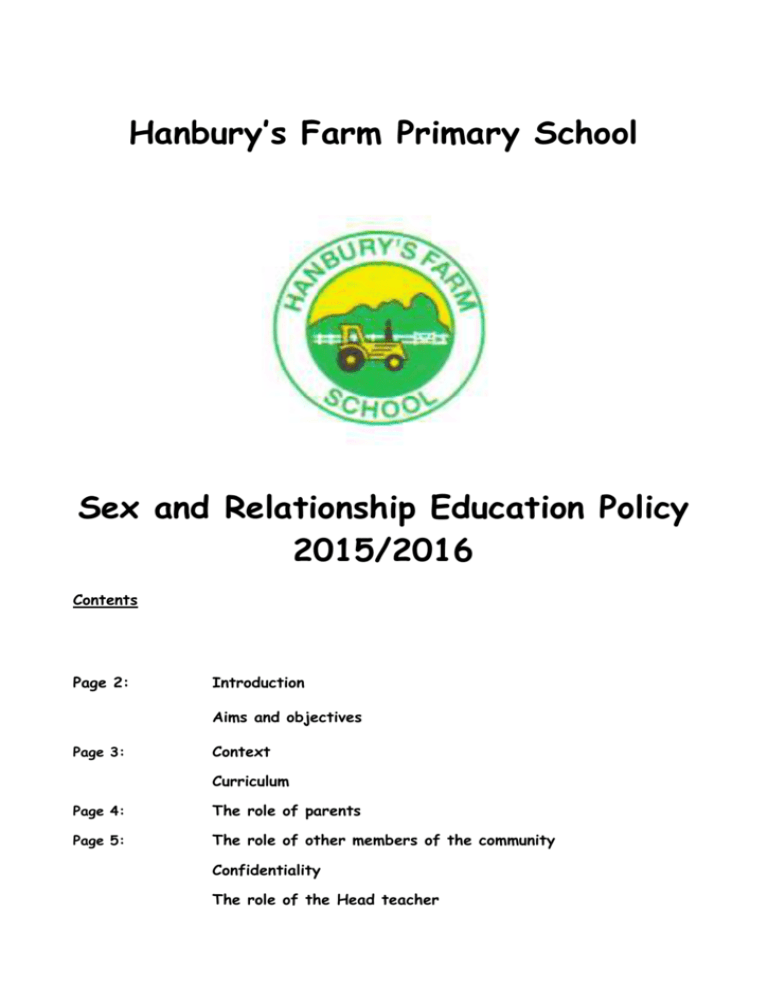
Hanbury’s Farm Primary School
Sex and Relationship Education Policy
2015/2016
Contents
Page 2:
Introduction
Aims and objectives
Page 3:
Context
Curriculum
Page 4:
The role of parents
Page 5:
The role of other members of the community
Confidentiality
The role of the Head teacher
Introduction
We have based our school’s sex education policy on the DfEE guidance document ‘Sex
and Relationship Education Guidance’ (ref DfEE 0116/2000). In this document, sex
education is defined as:
‘learning about physical, moral and emotional development.’ It is about understanding
the importance of marriage for family life, stable and loving relationships, respect,
love and care. It is also about the teaching of sex, sexuality, and sexual health’.
Sex education is part of the personal, social and health education curriculum in our
school. While we use sex education to inform children about sexual issues, we do this
with regard to matters of morality and individual responsibility, and in a way that
allows children to ask and explore moral questions. We do not use sex education as a
means of promoting any form of sexual orientation.
Aims and objectives
We teach children about:
• The physical development of their bodies as they grow into adults;
• The way humans reproduce
• Respect for their own bodies and the importance of sexual activity as part of a
committed, long-term, and loving relationship
• The importance of family life
• Moral questions
• Relationship issues
• Respect for the views of other people
• Sex abuse and what they should do if they are worried about any sexual matters
2
Context
We teach sex education in the context of the school’s aims and values. While sex
education in our school means that we give children information about sexual
behaviour, we do this with an awareness of the moral code and values, which underpin
all our work in school. In particular, we teach sex education in the belief that:
• Sex education should be taught in the context of marriage and family life
• Sex education is part of a wider social, personal, spiritual and moral education
process
• Children should be taught to have respect for their own bodies
• Children should learn about their responsibilities to others, and be aware of the
consequences of sexual activity
• It is important to build positive relationships with others, involving trust and
respect
• Children need to learn the importance of self-control
Curriculum
We teach sex education through different aspects of the curriculum. While we carry
out the main sex education teaching in our RESPECT curriculum, we also teach some
sex education through other subject areas (for example, science and PE), where we
feel that they contribute significantly to a child’s knowledge and understanding of his
or her own body, and how it is changing and developing.
In RESPECT time we teach children about relationships, and we encourage children to
discuss issues. We teach about the parts of the body and how these work. We
encourage the children to ask for help if they need it.
In science lessons in both key stages, teachers inform children about puberty and
how a baby is born. For this aspect of the school’s teaching, we follow the guidance
3
material in the national scheme of work for science. In Key Stage 1 we teach children
about how animals, including humans, move, feed, grow and reproduce, and we also
teach them about the main parts of the body. Children learn to appreciate the
differences between people and how to show respect for each other.
In Key Stage 2 we teach about life processes and the main stages of the human life
cycle in greater depth.
In Years 5 & 6 we place a particular emphasis on health education, as many children
experience puberty at this age. We liaise with the Local Health Authority about
suitable teaching materials to use with our children in these lessons. Teachers do
their best to answer all questions with sensitivity and care. By the end of Key Stage
2, we ensure that both boys and girls know how babies are made and born, how their
bodies change during puberty, what menstruation is, and how it affects women. We
always teach this with due regard for the emotional development of the children (as
stated earlier in this policy).
The role of parents
The school is well aware that the primary role in children’s sex education lies with
parents and carers. We wish to build a positive and supporting relationship with the
parents of children at our school through mutual understanding, trust and cooperation. In promoting this objective we:
• Inform parents about the school’s sex education policy and practice
• Answer any questions that parents may have about the sex education of their child
• Take seriously any issue that parents raise with teachers or governors about this
policy or the arrangements for sex education in the school
Parents have the right to withdraw their child from all or part of the sex education
programme that we teach in our school. If a parent wishes their child to be
withdrawn from sex education lessons, they should discuss this with the Head
4
teacher, and make it clear which aspects of the programme they do not wish their
child to participate in. The school always complies with the wishes of parents in this
regard.
The role of other members of the community
We encourage other valued members of the community to work with us to provide
advice and support to the children with regard to health education. In particular,
members of the Local Health Authority, such as the school nurse and other health
professionals, give us valuable support with our sex education programme.
Confidentiality
Teachers conduct sex education lessons in a sensitive manner and in confidence.
However, if a child makes a reference to being involved, or likely to be involved in
sexual activity, then the teacher will take the matter seriously and deal with it as a
matter of child protection. Teachers will respond in a similar way if a child indicates
that they may have been a victim of abuse. In these circumstances the teacher will
talk to the child as a matter of urgency following protocols laid down in the child
protection policy. If the teacher has concerns, they will draw their concerns to the
attention of the Head teacher. The Head teacher will then deal with the matter
in consultation with health care professionals. (See also Child Protection Policy.)
The role of the Head teacher
It is the responsibility of the Head teacher to ensure that both staff and parents
are informed about our sex education policy, and that the policy is implemented
effectively. It is also the Head teacher’s responsibility to ensure that members of
staff are given sufficient training, so that they can teach effectively and handle any
difficult issues with sensitivity.
5
This policy will be reviewed annually by the governing body.
Signed ______________________________ [Mr Peter Hollis]
(Headteacher)
Date ______________________________
Signed ______________________________ [Miss Rebecca Swaddle]
(SENCo)
Date ______________________________
Signed ______________________________ [Mrs Christina Siekierska]
(SEN Governor)
Date ______________________________
This policy will be reviewed annually.
Dated: April 2015
Review: April 2016

